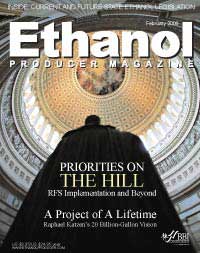February 2006
 View Full Print Edition
View Full Print EditionBusiness Briefs
Columns

A View from the Hill
By Bob Dineen

The Way I See It
By Mike Bryan
LegalPerspective
By Mark Hanson and Todd Guerrero
Talking Point
By Mike Bryan, CEO BBI International
Editor's Note
By Tom Bryan
NBB In Sight
By Alan Weber
Featured

Advice from the Wise
By Dave Nilles
The ethanol business can be tricky at times. With more plants crowding into the mix, each one needs to be running at its peak. EPM takes a look at what some industry leaders feel are important factors to consider when putting together a project.

State Policy Roll Call
By Ron Kotrba
With a federal renewable fuels standard now signed into U.S. law, state legislative actions represent practical mechanisms by which the ethanol industry can secure its next big growth spurt.
Priorities on the Hill - RFS Implementation and Beyond
By Jessica Sobolik
The Energy Policy Act of 2005, including the renewable fuels standard, was a four-year battle fought in no small part by U.S. trade associations and advocacy groups representing ethanol and agriculture. Now that the legislation has enacted a 7.5 billion-gallon renewable fuels mandate, EPM explores the new goals and challenges that face the industry.

The Project of a Lifetime
By Ron Kotrba
After a half century in ethanol, Raphael Katzen—one of the industry's greatest minds—still strongly believes in Project 20, a plan to produce and use 20 billion gallons of cellulosic ethanol by 2020. Now, more than ever, his vision looks attainable.
Cause AND Effect: The Impact of the RFS
By Kory Wallen
The U.S. ethanol industry is now working on ways to implement the renewable fuels standard's numerous mandates and regulations. Meanwhile, some experts are looking at possible long-term effects—both direct and peripheral—that the policy may have on the U.S. grain prices, land availability and the animal feed ingredient markets.
Outbacking Ethanol
By Kory Wallen
In Australia, ethanol production has been around since the late 1920s. All gasoline sold in Queensland contained 10 percent ethanol from 1929 to 1959. Now, more than four decades after the renewable fuel exited the scene Down Under, there's growing public support to bring it back.

Right Place, Right Time
By Tom Bryan
The biofuels industry in Canada is miniscule in comparison to the United States, but the enthusiasm, resolve and ingenuity exhibited by those attending the 2005 Canadian Renewable Fuels Summit was anything but paltry. It's clear that a sustainable ethanol industry is emerging there, and despite the doubts of naysayers, it looks like wheat will be the nation's cornerstone feedstock.

Hopping Right Into Ethanol
By Tom Bryan
For some ethanol plants, controlling gram-positive bacteria is a continuous battle. With resistance to antibiotics on the rise—and distillers wet grains being produced in greater quantities than ever—producers are turning to alternative anti-contamination agents like IsoStab, a natural hops-based product that thwarts germs and allows yeast to dominate.
A Call To Action
By Tom Bryan
In his new book, Biodiesel America, energy expert and author Josh Tickell shatters the myth that America must remain dependent on Middle Eastern oil. Tickell shows how biodiesel could help invigorate the rural U.S. economy and create a stable domestic fuel source, while leaving our lifestyle and food supply completely untouched.
Compatible By Design
By Ron Kotrba
AGCO sells more tractors worldwide than any other company on the planet. Now, with its pervasive global reach, and strong commitment to customer support and innovation, it's working on establishing an edge with biodiesel.
Tennessee Steps It Up
By Gary DiGiuseppe
Tennessee is not known for growing soybeans, but biodiesel advocates are determined to make the renewable fuel work in the Volunteer State. Relying on alternative feedstocks-or shipping soybean oil in-will likely be part of the plan.
Up To the Challenge
By Raymond McAllister
Canada may lag behind the United States and Europe in biodiesel production and use, but well-organized municipal fleet groups-and companies with a stake in production and distribution-in British Columbia are helping to get the nation up to speed quickly.
Standard-For Good Reason
By Susan Jackson
Sodium methylate is a versatile chemical reagent that's been used for many decades in various industries to produce high-value end products like pharmaceuticals, food ingredients, pigments and crop-protecting agents. It's also the catalyst of choice for most biodiesel producers.
Everything Under the Sun
By Ron Kotrba
Europe, South America and North America have set the stage for an explosion of biodiesel production in the next few years, but as other regions of the world hop aboard the biodiesel bandwagon, feedstock choices and their availability will become increasingly important.
One Step At A Time
By Kory Wallen
Manitoba has been involved with biofuels since its first ethanol plant was built in 1981. Today, the Canadian province is working to create new strategies to increase the production and use of renewables-and biodiesel is a big part of the plan.
Contributions

Project Development in a Booming Ethanol Industry
By Mark Yancey

Managing Enforcement Issues Under Increased Compliance
By Billy VonSee & Todd Potas

Win-Win Producer-Contractor
By Brian Rinehart






